From Other Voices, Other Eyes by David Nunan
Chapter 4
One for the road
Just when the caterpillar thought the world was over, she became a butterfly.
— Barbara Haines Howett
She was feeling the strain before they left Yung Shue Wan Main Street. They had left the Central Ferry Pier late, all because of Howard, who had been detained at his office, despite the fact that it was a Saturday. They could hardly leave without him because it was his company that owned the junk. They could see it bobbing some way off on the water with a flotilla of other junks, bob, bob, bobbing. Existentially futile captures it perfectly: she must remember that for her diary. Every now and then, one of the wooden vessels peels away from the flotilla and lurches drunkenly towards their pier. Once it has been secured, a group of passengers detach themselves from the waiting throng, scramble aboard, and secure a seat, either at the front of the junk, in the larger rear deck, or on the roof. It was a complete mystery to her how the junk and the boarding party managed to pair up: just like a mother goose and her imprinted chicks, she thought. Meanwhile, they wait, wait, waited.
Ryan wouldn’t hear of it when she voiced the thought that she might stay in the flat out of the heat. His response was predictable. “Howard went to a lot of trouble to get the junk. It’s very competitive, particularly on the weekend. This is supposed to be a welcome-to-Hong-Kong treat for you.” She refrained from pointing out that it was less than a week since she’d arrived from New York, and was still jet-lagged. Add to that a hangover and lack of sleep thanks to the welcome-to-Hong-Kong office party he’d arranged for her the night before. “You can’t call yourself an expat until you’ve done a weekend junk trip – it’s a rite of passage.” She had no intention of ever referring to herself as an ‘expat’, but didn’t want to start a fight, not at this embryonic stage of their new life together, so she kept her mouth shut.
When Howard eventually turned up with his wife and daughters, he was suitably effusive in his apologies. Ryan made the introductions, but she failed to catch the wife or children’s names. Ordinary and unmemorable names, like the people themselves. While the introductions were taking place, another couple joined them as well as a family consisting of parents and two children. She had noticed them loitering on the pier, but as Howard was the common link, had no idea that they were part of the same junk party. The young German couple was on a short-term visit to Hong Kong. The husband was doing some sort of consulting work for Howard’s firm. The family was Australian: the parents large and overweight, and the children heading in the same direction. They were sloppily dressed and had harsh, nasal accents that she found unpleasant.
Howard, who had removed his jacket and tie, strode to the end of the pier and began flailing his arms in the air. One of the junks immediately detached itself and ploughed through the choppy water towards the pier. Getting aboard was tricky, and the Fat Family’s son almost ended up in the water, which would have been no great loss to humanity, she thought. She imagined that the father, Bruce, or Dave, or whatever he was called, would be one of those financial advisers whom she’d been warned about, and the wife would list her occupation as ‘domestic duties’.
Once on board, she sat at the rear of the junk, a little apart from the others. When they had cleared the choppy waters of the inner harbour and could move about, Howard opened a large ice chest and handed out cans of beer. She noted, with faint disapproval, that Ryan accepted one, although, like her, he was normally a moderate drinker. When she declined a beer, Howard offered her a wine, but she gave a grim little smile and said she’d be perfectly happy with a glass of water.
The original plan had been to arrive at Yung Shue Wan at noon, and walk the spine of Lamma Island, stopping at the strip of seafood restaurants at Sok Kwu Wan on the other side of the island, before heading back to Central. However, it was well after one o’clock by the time they disembarked and Howard had instructed the boat boys where to meet them on the other side of the island.
Yung Shue Wan Main Street was jammed with locals and expatriates. Expats, drinks in hand, spilled out of the bars. They were oblivious to her, and blocked her progress. Howard and his wife strode steadily and resolutely ahead. She had to admire the way they navigated their way through the crowds without obstructing those coming the other way. It was a peculiarly Hong Kong gift, and one that she, a New Yorker, was yet to acquire. Howard’s two daughters skipped about, seemingly unconcerned about the heat; the older one, balanced precariously between childhood and puberty, was undeniably pretty; the younger one overweight and flushed, not yet conscious of the gifts that nature had denied her.
Through the Main Street crowd and onto the path that led ominously upward, the pace picked up. She knew they were later than had been planned, but was it necessary to attack this outing as though it were a military campaign? In contrast to Howard’s girls, the offspring of the Australian couple, ugly, sandy-haired and freckled like their parents, began to whimper in the most irritating manner. She wanted to slap them. They weren’t the only ones who were suffering. The girl was particularly annoying, hanging off her stolid mother like an unwanted carry-bag. Before arriving at the ferry pier, she had decided on her persona for the day – calm, collected, ever so slightly aloof, ever so slightly Upper East Side. (Although she had been born a Midwesterner, she had erased this inconvenient truth and could totally do Upper East Side). Now, however, confronted by stifling heat, crowds and strong smells of unfamiliar foods, she felt her features rearranging themselves into a childish sulk. She saw intimations of her pre-pubescent self in the brat hanging off its mother’s arm, which made her dislike the child even more.
Why hadn’t she been warned that the track was so rough? Her shoes, so carefully chosen to show her calves to advantage, were utterly unsuitable for this outing. Ryan should have known. Resentfully, she let herself fall behind, and affected a slight limp. God it was hot. New York could get hot and sticky in midsummer, but this was of a different kind. With every soggy breath, you felt that you were drawing in not oxygen but unadulterated heat. Why, if they’d had to come at all, couldn’t it have been in the fall? When would they stop for a break? She could see wet patches spreading across the back of Howard’s white shirt. It was a mystery that he hadn’t thought to bring a change of clothing. There was momentary satisfaction when the sole of his left shoe parted company with the upper. Now they would have to stop. Now surely they would have to turn back. But then she remembered: the junk, their lifeline to civilization (or what passed for civilization in this part of the world) had been sent to the other side of the island. There could be no turning back. Howard stooped and reunited sole and upper with a handkerchief. How practical and unflappable he was, how nauseatingly British.
The upward progress was slowed by a gaggle of elderly Chinese. Although she had been in Hong Kong less than a week, she had come to find the sing-song squawk of the local dialect extremely irritating. Coming from New York, that most cosmopolitan of cities, she was of course familiar with a wide range of languages, including Chinese, but here it was unrelenting. At this moment, however, she was grateful for the respite provided by the group ahead of them, and temporarily forgave them their brutish tongue. She caught up with Ryan, relieved him of the water bottle, and drained it. “That’s all we have,” said Ryan reprovingly. She shrugged and handed back the empty bottle. It wasn’t her fault that he’d miscalculated the amount of water they would need for the walk.
At last they neared the top of the ridge, where the trail forked. “Please stop,” she said to herself. “This is unbearable.” Howard, impervious to telepathy, turned left and pressed on relentlessly up the trail that became ever steeper. Even his frolicking daughters began to flag. “How much further, Daddy?” the dumpy one asked. “We’ll soon be at the top, Sweetie,” he said. “It’ll be all downhill from there.”
She pictured herself sitting in the cool, dim recess of their flat, blinds drawn, the reassuring hum of the air-conditioning system, a novel upturned on her lap, Schubert’s string quintet on the CD player (rejection by the New York School of Music hadn’t diminished her passion for chamber music). She would compose an ironically dismissive account of her initiation into expatriate culture through her first junk trip and hiking expedition. Her friends had been most amused by the account of her adventure in the wet market.
“Shit! Fuck!” Startled, she looked up ahead. Howard was standing at the summit of their climb, confronting a pagoda-looking structure that marked the end of the trail. “Sorry, folks,” he said. “We took the wrong turn.” How pleasing it was to observe the quiver in his stiff upper British lip, to hear the murmured admonitions of his wife for his use of ‘language’ in front of the children. It was enough to make her temporarily forget her own distress.
They beat a retreat. While the going was easier now they were heading downhill, the heat grew more intense. They hadn’t proceeded far along the correct path when they came across a gathering of hikers, including the old Chinese people whom they had passed before taking the wrong turning. All eyes were on something happening just off the trail. Howard’s girls and the two Australian brats pushed their way through the assembly to see what the attraction was. One of the girls gave a squeal – the fat one, she assumed for no good reason. What she saw simultaneously sickened and fascinated her. A large python had caught, strangled, and was in the process of ingesting a feral cat. It looked a very painful process. The snake didn’t seem to be enjoying it much, and it can’t have been at all pleasant for the cat. The unlikely incident confirmed in her own mind the fact that despite its veneer of sophistication, Hong Kong was uncivilized.
When Ryan’s company made it clear that his career path would be facilitated by a tour of duty abroad, he had been offered the choice of the Singapore or Hong Kong office. Although she’d never been to Singapore or Hong Kong, she wasn’t keen on either place. When you lived at the centre of the known universe, what was the point of living anywhere else? However, Ryan was a sensible type who put his career above all else, and he persuaded her that it wouldn’t be the end of the world to spend a couple of years in the lap of expatriate luxury. So she did her research, and settled on Singapore, which looked cleaner and more manageable than Hong Kong. Ryan flew out on a reconnaissance flight, and returned declaring Singapore to be the dullest place he had ever visited. “You’d die of boredom there within a week,” he said. So, Hong Kong it was. Perhaps she should have visited Singapore and formed her own opinion.
Sickened by the snake incident, and the fact that only the spectators seemed to be getting any pleasure out of the meal, she pushed through the crowd, and set off along the trail by herself. For the first time, she found herself ahead of the junk party. Was she imagining things, or was it really cooler here on the ridge with a breeze coming off the ocean? Maybe it had to do with the fact that, for a short time at least, she was able to progress at her own pace. She paused and took in the view. It was one of those rare days when the pollution had been rolled back to China and the view was spectacular. Other islands were dotted about the ocean. The vegetation bordering the trail had a clean, earthy smell. Although it differed from the scents of her childhood in the Midwest, there was something familiar, something pleasing about it. For the first time since her relocation from New York, she was possessed by a lightening of the spirit: you wouldn’t call it happiness, but it wasn’t far off.
The only blight was the trash strewn along the trail: cigarette packets, drink cans, bits of paper: another indication of the unevolved state of the place. Determined not to let the trash at her feet change her mood, she kept her eyes set firmly on the horizon and the trail ahead.
The rest of the party, having watched the cat finally disappear into the snake, caught up with her. Ryan fell into step beside her, and she surprised herself, as well as him, by allowing him to take her hand.
When she had learned that their walk would terminate at a seafood place, she had assumed that they would be eating in something that was recognizably a restaurant. Instead, she found herself in a large open space bounded on one side by a rustic waterfront, and on the other by fish tanks containing all manner of alarming sea creatures. Although it was approaching three o’clock, the place overflowed with parties of diners. Some groups were exclusively locals, some exclusively expats (gweilos, she’d been told was the endearing Chinese term for foreigners), and some groups were mixed. Everyone seemed to be in a happy frame of mind.
They were seated at a circular table by the water, which had an oily consistency and oozed and sucked around the pylons supporting the restaurant. It also supported dozens of polystyrene boxes and other bits of floating rubbish, and had a toxic smell. She steered Ryan to two chairs facing away from the water. There was nothing that could be done about the horrible smell of rotting fish, but at least they wouldn’t have to look at the unappealing water. It was a momentary setback to find herself sitting next to the Australians, but there was nothing to be done about that either. She anticipated the questions that would already have their lips twitching: “How long have you been here?” and “What do you do?”, questions that had bombarded her at the party the previous evening. In response to the query about what she did, she had made the mistake of saying that she didn’t do anything – she’d only just set foot in the place, for heaven’s sake. The reply had people nonplussed, and she was discarded as a person of no interest. It wasn’t that they were rude, they just couldn’t think of anything to say to someone who had no visible means of filling in their time. She wouldn’t make that mistake again. She refused to be humiliated or patronized by the Antipodeans.
Determined to keep the conversation steered firmly away from herself, she got in first, and asked the Australians what they did. She hadn’t been in Hong Kong long enough to learn not to be taken aback by anything that people said or did. It therefore came as quite a surprise – you could almost say a shock – to learn that the lumpen Australians were not what she had assumed them to be. He was a cardio-vascular surgeon, one of the best in Hong Kong she was later to learn. His wife had her own real estate business, letting luxury apartments to expatriate executives.
The food was another surprise. They had barely settled into their seats when beer, wine, water and soft drinks appeared at the table. The plates of food, which Howard must have pre-ordered, appeared not long afterwards. Although the restaurant was primitive, the tables set with faded gingham cloths and plastic dishware, the food was remarkably good: salt and pepper squid, baby lobsters steamed with ginger, a large fish poached in broth. The dishes kept coming. At first she eyed the plates with suspicion. Little care or attention had been paid to the presentation of the food, but she was hungry after the long walk, and so she allowed herself a lobster tail, and a small piece of fish. It turned out to be unusually tasty. Her mood continued to improve to the point where, the second time Howard pressed a glass of wine on her, she accepted. After her third glass, she found herself chatting animatedly to the Antipodeans. They really were very nice. Even their children were forgivable. And they never once asked her how long she’d been in Hong Kong or what she did. There was a distinct possibility that she would allow them to become her friends.
On their way back to the junk, she regretted having consumed the fourth glass of wine. She thought that all they had to do was to walk the fifty metres to the ferry pier set in the middle of the stretch of seafood restaurants. Her buoyant spirits sagged when she discovered that the junk was waiting for them in another bay, a twenty-minute walk from Sok Kwu Wan village. This required them to retrace their steps towards Yung Shue Wan before branching off on a side track which took them through market gardens and another village before surmounting a small hill, and descending onto a pretty beach which was marred by a hideous power station with several tall chimney stacks, each of which belched smoke into the sky. The rest of the party had armed themselves with cans of Tsingtao for the return walk and were feeling no pain, but recalling her own pain from the morning walk, she stuck with water.
As they descended to the beach, the young German couple accompanied her. The male (Hans? Franz?) was an architect. His partner didn’t volunteer an occupation and given her own sensitivity on the subject, she had no intention of asking. Being German, they would be less easily deflected than the Australians. The walk was bearable: shorter and on a trail that had been paved. The sun was on its way toward the horizon, so it was also cooler. On the beach, they noticed two junks about two hundred metres offshore. Howard tried calling the boat boys only to discover that their phones were switched off. How tiresome, she thought. Small setbacks constantly threatened to derail her positive mood. Howard attempted to attract the attention of the boat boys by leaping up and down on the beach, flailing his arms in the air and shouting. When this failed to work, he began to remove his shirt and pants. Thankfully, the children had wandered off down the beach and were spared the sight of his puffy, white flesh, and his utter ridiculousness, standing in nothing but his boxer shorts with the water lapping about his ankles. She was not so spared. She had a sense of foreboding, remembering the amount of alcohol that he’d consumed throughout the afternoon. She herself had no taste for swimming and had been traumatized when Ryan had once taken her kayaking. Howard’s wife voiced her own concern, but he turned his back, waded into the water and struck out toward one of the junks. He swam very slowly, and for a time it seemed as though he was making no progress whatsoever, but gradually, the bobbing head grew closer to its target.
The men turned their attention to demolishing the plastic bag of beers, but she and the wife kept their eyes on the bobbing head. The pretty pre-pubescent daughter returned from the far end of the beach. “What’s Daddy doing?” she asked. “He’s fetching the junk,” said her mother. The German architect scanned the water, which had taken on an ominous, oily sheen as the sun descended.
“There is only one problem,” said the German.
“What? What problem?” asked the wife.
“He’s swimming toward the wrong boat.”
The others laughed at Howard’s foolish mistake, but the wife saw nothing to laugh about. “He must be getting tired,” she said. “He doesn’t get a lot of exercise.” Realizing its mistake, the head changed direction, and began creeping toward its intended target, about fifty metres away. The light was fading rapidly now, and it was becoming increasingly difficult to follow the progress of the head, which at one point disappeared beneath the water momentarily before reappearing. Her anxiety increased. The junk was their lifeline to civilization, while Howard was their lifeline to the junk. The second time the head disappeared, it didn’t reemerge. “I can’t see Daddy,” said the pretty daughter in a small voice. The fat one, who had joined her sister, began to cry. The wife put her arms around the girls and stared at the spot where Howard’s head had last been seen, as though she could make it reappear by force of will. At this point, all that remained of his existence was a small pile of crumpled clothing on the beach: a soiled white dress shirt, grey suit pants, a pair of grey socks – one with a hole in it – and a pair of shoes, one of which was very close to the end of its natural life. That pathetic pile of clothes and the broken shoe might be the last things his daughters would have to remind them of who and what he was.
While she was concerned for Howard’s safety, she was also irritated. The utter foolishness of his alcohol-fuelled action looked likely to ruin the day for everyone. She put her foot down when Ryan suggested that he might swim out and see if he could do anything. What could he possibly do? The Australian doctor, who presumably knew more about the tenuousness of life than the rest of them, agreed with her. The Germans had been standing apart, continuing to scan the water. Then the architect said, “There he is,” pointing towards the junk. Each with his or her own interrupted interior narrative watched in silence as the bulky form pulled itself onto the boarding platform at the rear of the boat.
When they clambered aboard the junk, Howard was sitting at the large common table on the rear deck with a beach towel wrapped carelessly around his ample waist. He had a beer in his hand and was looking smug. She was puzzled at the look until she realized that he had no idea of the consternation he had caused. Why shouldn’t he glow with self-satisfaction? He had reunited them with the junk and had thereby saved the day. And he had done it with old-fashioned masculinity: no need for technology whatsoever. Disappointingly, all his wife had to say was, “Oh, Howard!”
As they headed away from Lamma, she took herself and glass of wine to the front of the junk and settled on the padded bench. The breeze had lifted and was blowing cool off the water. They became part of a flotilla heading home. Heading home. Had she really allowed herself to entertain those words? Ahead, Hong Kong Island was a blaze of lights, running from Aberdeen all the way up to The Peak. Yes, she decided, she could manage Hong Kong. The first order of business was to get a job. She would work on that tomorrow. It couldn’t be too difficult, not with her talents and Ryan’s contacts. Buoyed at the notion, she held out her glass as dishevelled Howard, reunited with his work clothes, lurched past with a wine bottle.
“One for the road?” he asked.
“One for the road,” she replied.
* * *
I bump into her at the bank where she is closing an account. In a few days, she is returning forever to New York, the place where she belongs. In less than a year, her steely resolve has dissolved. Ryan will stay on for six months, and then join her at Christmas. “Will he?” I wonder.
A freelance editor friend of mine, who has looked over the manuscript for me, pauses at this story. “What’s it got to do with Hong Kong?” she asks. “Everything,” I reply.
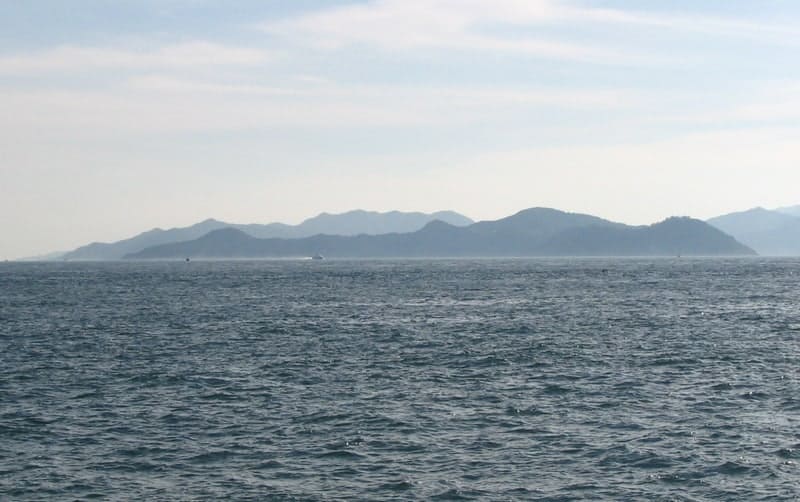
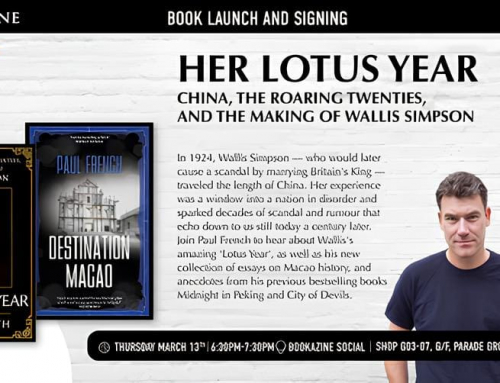
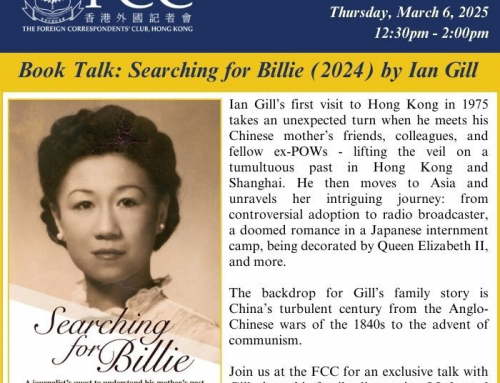
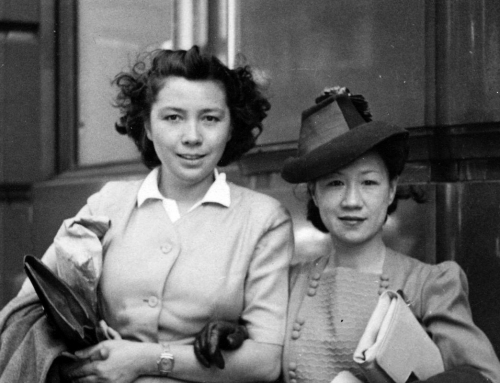
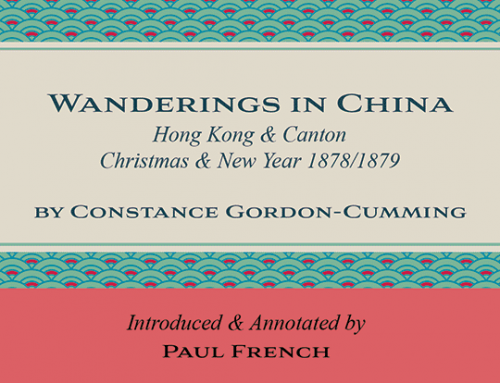

Leave a reply